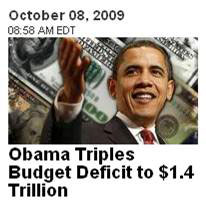Conservatives claim that President Obama "tripled the deficit" and point to the huge 2009 budget deficit as proof. They use charts that show the fiscal-year 2009 deficit, as reported in October was, indeed, about triple the prior year's borrowing. But the 2009 budget was the last budget year of the prior, conservative administration. It is just one more demonstration of the failure of conservative policies.
Basic math: A budget year that ends 9 months into a President's first year wasn't that President's budget.
Yet we hear, over and over, that "Obama tripled the deficit." Recently, when President Obama spoke at the Republican caucus retreat, Rep. Jeb Hensarling of Texas said that Obama had "tripled the deficit." A CNN fact check addresses this,
Obama was essentially correct when he said he inherited a budget deficit of $1.3 trillion. Though the budget deficit for 2008 was a then-record $458.6 billion, the CBO issued a projection in January 2009, just days before Obama took office that the budget deficit would reach $1.2 trillion that year, before the cost of any new stimulus plan or other legislation was taken into account.
Don't believe me? See the conservative Cato Institute on this: Don’t Blame Obama for Bush’s 2009 Deficit | Cato @ Liberty,
Listening to a talk radio program yesterday, the host asserted that Obama tripled the budget deficit in his first year. This assertion is understandable, since the deficit jumped from about $450 billion in 2008 to $1.4 trillion in 2009. As this chart illustrates, with the Bush years in green, it appears as if Obama’s policies have led to an explosion of debt.
[chart]
. . . But there is one rather important detail that makes a big difference. The chart is based on the assumption that the current administration should be blamed for the 2009 fiscal year. While this makes sense to a casual observer, it is largely untrue. The 2009 fiscal year began October 1, 2008, nearly four months before Obama took office. The budget for the entire fiscal year was largely set in place while Bush was in the White House.
[corrected chart]
Please click through to see the charts. And then look at Cato: Who's To Blame for the Massive Deficit? for an even better explanation,
What about the so-called stimulus, they will ask, with its $787 billion price tag? Or the omnibus fiscal-year 2009 appropriations bill? And how about Cash for Clunkers and Obama's expansion of the children's health insurance program? Didn't these all boost spending in 2009?
The answer is yes. But these boondoggles amounted to just a tiny percentage of FY2009 spending — about $140 billion out of a $3.5 trillion budget — as the pie chart nearby illustrates.
Here are some examples of how this propaganda is applied. Keep in mind as you read these and look at the charts that the 2009 budget was Bush's last budget, and began before Obama even took office.
Heritage Foundation: Bush Deficit vs. Obama Deficit in Pictures. Look at how the colors on the chart trick you into thinking that 2009 is an Obama budget year. This is just outright deceit.
Here is Heritage directly labeling the 2009 budget as Obama's in a chart.
Here is a similar use of deception in charts, by right-wing blogs.
More examples: Federal budget triples under Obama – yes TRIPLES, and After Tripling The Deficit, Obama To Try And Create Jobs With More Government Spending, and Obamanomics: Deficit Tripled in One Year
Fox News: Obama Triples Budget Deficit to $1.4 Trillion (they have since changed the headline but here is it as it appeared:) 
Here's a good one, using a Heritage propaganda chart: Obama’s Tripling of the National Debt in Pictures
The right's noise maching is good, though, there are 27,000 websites listed if you search for "obama tripled the deficit" in quotes.
Conservative policies since Reagan have led to massive debt. Don't let them trick you by changing the colors on a chart.

